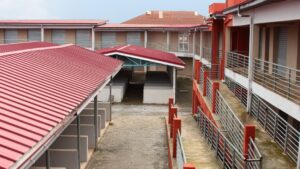
Attempts by members of the opposition National Democratic Congress (NDC) to prevent Mr Martin ABK Amidu from working as the Special Prosecutor has hit the rock, as the nation’s apex court has affirmed that the ‘Citizen Vigilante’ qualifies to hold the position.
The Supreme Court, in a 5-2 majority decision, yesterday dismissed a suit filed by a former Deputy Attorney General, Dr Dominic Ayine, challenging Mr Amidu’s eligibility for the position.
Dr Ayine had contended that Mr Amidu, at 66, had passed the age of compulsory retirement from public service, and was therefore not qualified for the position at the time of his appointment.
In the suit he filed in February 2018, the former Mahama appointee sought a declaration that, per the interpretation of Articles 190(1)(d), 199(1), 199(4), and 295 of the 1992 Constitution, the retirement age of all holders of public offices created pursuant to Article(1)(d), is 60 years, thus Mr Amidu was not qualified or eligible to be nominated as the Special Prosecutor.
Ruling
However, the Supreme Court, in its majority decision, dismissed the suit yesterday. Five judges of the superior court, Chief Justice Anin Yeboah, Justice Bafffoe Bonnie, Justice Marfo Sau, Justice Nene Amegatse and Justice Prof Ashie Kotey were in the majority, while two others, Justice Sulley Gbadegbe and Justice Agnes Dodzi dissented.
The court did not immediately give reasons for the decision, and directed lawyers to pick the ruling up from the court’s registry today, Thursday, May 14 2020.
Case
Dr Ayine, Member of Parliament for Bolgatanga East, argued in his statement of case accompanying the writ that by nominating and appointing Mr Amidu to be vetted and approved by Parliament, both the Attorney-General and the President had violated Article 199 (1) of the 1992 Constitution.
“The Office of the Special Prosecutor was established by an Act of Parliament pursuant under Article 190 (1) (d) of the 1992 Constitution, which confers on Parliament the power to create such other public services as it may prescribe, in addition to the public services spelt out in Chapter 14 of the 1992 Constitution.
“The Office of the Special Prosecutor is, thus, a creature of the Constitution to the extent that it is a direct offshoot of a power drawn from Article 190. Once Parliament passed Act 959 and the President assented to it on January 2, 2018, the Office of the Special Prosecutor became part of the public service and governed by the constitutional provisions relating to the public service and public office holders,” he further contended in his statement of case.
The former Deputy A-G also argued that by a true and proper interpretation of Articles 190 (1) (d), 199 (1), 199 (4) and 295 of the 1992 Constitution, the retiring age of all holders of public offices created pursuant to Article 190 (1) (d) was 60 years and not beyond 65 years.
He named the A-G and Mr Amidu as defendants in his legal action. However, on February 5, 2019, the Supreme Court struck out the name of the Special Prosecutor as a defendant after it had held that he was not a proper party to the action.
Defence
Godfred Yeboah Dame, a Deputy Attorney-General, offering a defence for the state, argued that while the compulsorily retirement age of public officers is at 60, there is a possibility of extension of their years of service under Article 199 (4), adding that not all public officials are caught by the compulsory retirement age of 60. He prayed the court to hold that the position of Special Prosecutor is a public office (organ) like the Statute Law Revision Commissioner, not caught by the retiring age prescriptions in Article 199.
Mr Dame further argued that by the combined effect of Articles 88 (4) and 298 of the 1992 Constitution, the enactment of Act 959 to provide for the appointment of a Special Prosecutor on a non-renewable seven-year tenure, and the subsequent appointment of Mr Amidu to that office, were within the rightful legislative competence of Parliament.








